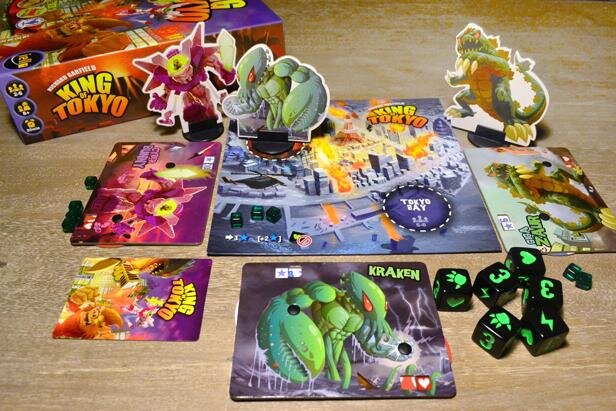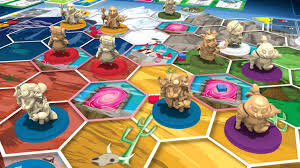Board games for kids that are actually good.
This week I saw yet another article proclaiming some form of board game angst.
In this comical piece of self-deprecation, Sackville offers the tale of how cool was her 12-year-old daughter, while Sackville herself was having a Monopoly-fuelled meltdown.
Funny! But just a little bit too true. Some games (especially Monopoly) do indeed inflame familial tensions, yet parents often have no idea what else they can offer their kids.
So for those parents out there, wishing to know which games might bring familial joy and harmony, and for Kerri, this one's for you.
Let's dive in with a hard truth:
We, the feeble.
We might presume that it is the kids’ diminished capacity that we have to work around to find games for both of us, but I have news for you: It’s not them, it’s us.
Kids learn new things all the time. It's their job. It's us who are a bit slow.
This is why we reach for terrible games such as Monopoly. New games would mean learning new rules, and we haven’t done that since we wore plastic shoes.
Frankly the only thing going for Monopoly is that we are familiar with it, and this is only because we were introduced to the game under exactly the same circumstances – our uncle didn’t know what else to give us, so gave us that.
Monopoly sucks, but nobody will blame you for gifting it. It’s a gift that deflects criticism.
Monopoly has us in a generational bind! Break free! Break free!
Can we just play?
Children have an enormous capacity for learning, and can do so at an astounding rate.
But they do tend to have a short attention span, which means that it is up to us to learn the rules of a game and teach it to them, to get them playing before they get bored of our exposition.
This means choosing games where their first turn can be explained in under a minute, so that by the time your brow unfurls from the strain of your own concentration, they can be throwing dice, moving pieces or picking cards.
Kids also aren’t great with too much abstract thought, but latch onto theme. You’re not moving a block, but a bunny; not a die, but a dinosaur. Use your storytelling skills.
This also enables your children can teach it to other children. The more a game is story-like, the easier they can teach each other, and the less will get lost in translation.
A good game starts easy on the front end, with small decisions steeped in character and story, gradually becoming more complex as the game unfurls.
This is also kinder on us, oh slow-minded ones. You might even find that, after a minute of rules explanation, you could have a half-hour conversation with your sister-in-law, come back and discover that they know how to play better than you.
To the games already!
Okay – the games. Let’s go.
Love Letter
You need to get your letter to your love – the princess.
Love Letter
Pick a card – that’s who has your letter. Pick another, keep one and play the other for its effect.
Your letter may be discovered and destroyed. Awww. If not, then whoever’s letter gets closest to the princess by the end of the game (the higher number card) wins and the princess has read your letter.
Isn’t that a lovely game? Cheap too. You can get it in Batman theme if the theme is too gentle for them, or you can go for full combat mayhem.
King Of Tokyo.
Mayhem!
King of Tokyo
You know how to play Yahtzee, yes? Roll dice, keep some, roll the rest, keep some, roll again.
That, plus you play monsters. Choose a monster. Big lizard? Great.
If you roll claws, you damage others. Heart – heal yourself. Triple numbers – points. Lightning – get a cube to buy cards for stuff like fire breathing.
Crush, kill, destroy, be the last monster standing or get to 20 points to win.
Done! That’s all the important rules. I have taught this game in one breath and still had enough air left to blow out a birthday candle.
I would recommend this game for the kind of kid who likes pillow fights. They will get killed off, sure, but there is so much randomness in the roll that they can justify their loss as luck, and each game lasts only20 minutes, so with a quick shuffle of the extra stuff cards, they just start again and play again.
Dixit
Perhaps your youngster is a bit more of a pacifist. Maybe they like art instead of combat.
Dixit
Dixit has you picking a surrealist painting from your hand, saying a word or two as a clue, then placing it face-down in the middle, where everyone else will also place a picture based on your words.
Shuffle, flip, and everyone except you guesses which was the original. You want at least one person guessing correctly, but not everyone.
The best age for this is: as young as possible, before they turn into a precocious teenager.
Forbidden Island
As soon as they are a precocious teenager, they might like to express their opinion as to how to work together. Or to tell you what to do.
Forbidden Island
Your team needs to grab artefacts on a sinking island and get to the helicopter before the island sinks completely. You can move, fix the ground, swap cards, grab the loot or use the special ability on your personal card.
It’s a co-op! You work together to all win together. Crazy, I know.
Super-easy to learn as soon as you unpack the box, you won’t always win Forbidden Island, sometimes you meet a watery end, but you will share your tragedies and triumphs together, then start again quickly.
If you like that, you can move on to Forbidden Desert and Forbidden Sky – same idea, new place, new adventure.
Then again, you might like a slightly deeper game, and get back to competition.
My Little Scythe
Scythe is a heavy economic and combat game for hardcore gamers about resource management and mech battles. It’s pretty awesome, but this is not the game I’m talking about.
My Little Scythe
My Little Scythe is the same game, but designed specifically for children. Much of the strategy remains, but so streamlined and simplified that kids and non-gamers can pick it up and start playing straight away.
The theme is also youngster-oriented, as you guide various cute species to success, make friends, and at most have a ‘pie-fight’.
It is still such a strategic game that it can take game newbies of any age – that means you – to game enthusiasts in a few short plays, then have the whole family looking for the next game challenge, and the next.
Sushi Go! and Barenpark
Sushi Go! is a very cute and remarkably simple game where you pick a happy sushi snack, then pass your hand on, hoping for collectable sets in a number of rounds until the cards run out.
Bärenpark
The same designer, Phil Walker-Harding from Sydney, also came out with many people’s favourite go-to bear game, Bärenpark, where youTetris your way into building a bear theme park, filling spaces that let you pick up more oddly-shaped polar bear enclosures to place next turn.
Both are very simple to learn, and feature no combat nor antagonism, yet afford plenty of strategy.
The Brigade
Ben Hoban from Melbourne generally designs with his daughter in mind, and likes the mayhem of a world similar to Pratchett’s Discworld, but without the copyright infringement.
Photo: Red Genie games
The result is The Brigade, where rather than working together as the city catches fire, four competing fire departments peopled with trolls, gnomes and golem rush about in competition, improving their trucks and claiming more bases as you expand your firefighting network before the fire claims the whole city.
The same company, Melbourne's Red Genie is also about to come out with a new, simple, strategic and super-cute game The Damsel’s Tale where one player is a gallant knight, and the other a baby dragon trying to alert its mother about the knight climbing the mountain path.
Other ways to get to know games
We are in the best era for board games, and Youtube has made that possible.
Early on there was a guy named Scott Nicholson who used his channel to show you how each game was played. He’s still around. Thanks Scott.
Now there is Wil Wheaton – Wesley Crusher from 80s Star Trek– with his series called Tabletop, where you can learn the games, then watch celebrities playing them, so see if it’s the kind of game experience you might like.
Now that you have a list of go-to games, and other resources at your disposal, you can get your family off the cycle of such awful games asMonopoly, and on to the rich and life-affirming material that is to be found in pretty much every other game.
Go forth, adventurer!











